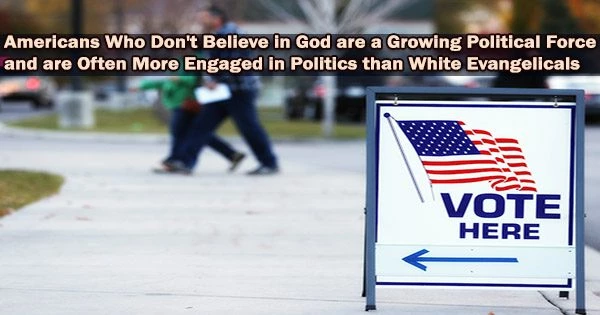Given the efforts to rig the 2020 presidential election, it’s difficult to recall, but the day after votes were cast, one topic stood out: voter turnout.
According to a Pew Research Center report, voter turnout in every state of the US was greater in 2020 than it was in 2016. According to the Federal Election Commission, there were more than 158 million ballots cast in total, approximately 22 million more than only four years earlier.
Voters will likely select which political party will be in charge of the U.S. House of Representatives and the Senate in January 2023, therefore turnout will likely play a significant role in the 2022 midterm elections as well.
As a political scientist who studies the intersection of religion and politics, “I am interested in which groups may have a strong impact on the balance of power. And if the data is any guide, there are two key communities political analysts often overlook: atheists and agnostics.”
Partisan divides
According to my examination of data from the Cooperative Election Study, or CES, an annual survey organized by a team at Harvard University, over 8% of the entire U.S. population declared themselves to be atheist or agnostic in 2008. Atheists hold that there is no greater force in the universe, whereas agnostics assert that it is impossible to know for sure whether there is or not.
By 2021, that share had risen to just about 12%. However, atheists and agnostics frequently lean left in terms of their political beliefs, and their quick ascent in the country’s religious landscape is turning out to be much more significant for the Democratic Party than the Republican Party.
Just 4% of people who align with the Republican Party say that they are atheist or agnostic. That same figure was 3% when Barack Obama won the White House in 2008.
However, according to my analysis of the CES data, 1 in 5 Democrats today are atheist or agnostic, an increase of eight percentage points from 2008.
Getting to the ballot box
The mere fact that these groups now make up a larger portion of the population does not guarantee that their rise will result in gains for them in the midterm elections in 2022.
While political scientists have struggled to determine how to assess voter participation using survey data, it is possible to utilize other methods to determine how politically engaged atheists and agnostics are, and there is compelling evidence that they will cast a significant vote on election day.
In the CES, respondents are questioned about their involvement in various political activities over the previous 12 months. When white evangelicals, another group that is sometimes seen to be particularly politically active, are contrasted with secular Americans, it brings the political participation of secular Americans into closer perspective.
The religious right has achieved several triumphs over the past 40 years by mobilizing a loose alliance of theologically and politically conservative religion organizations to participate in politics, advocate for causes, and agitate. Overturning the Roe v. Wade decision, for example which the Supreme Court did in June 2022 was a long-cherished goal of the movement, resulting in several states’ banning abortion in nearly all circumstances.
According to the CES, 8% of white evangelicals attended political gatherings like school board or municipal council meetings in 2020. Atheists make up 11% of the population, while agnostics make up 10%. The statistics regarding sticking up a political yard sign or bumper sticker likewise showed a slight difference. Compared to 21% of white evangelicals, 27% of atheists had done so.
However, there is little question that Americans who identify as secular are more politically active when it comes to demonstrations. According to CES statistics, only 5% of white evangelicals reported attending a political march or demonstration in 2020, compared to 18% of atheists and 16% of agnostics. The gap is much more pronounced when it comes to donations.
In 2020, 43% of agnostics and 50% of atheists gave to political causes. Comparatively, only approximately 25% of white evangelicals sent money to a political cause or party.
Speaking up and being heard
Democratic candidates have been increasingly conscious of their growing reliance on secular voters. For instance, in order to specifically address the interests and concerns of these voters, members of Congress established the Congressional Freethought Caucus in April 2018.
Despite still making up a small percentage of the population, atheists and agnostics are likely to influence the 2022 midterm elections by supporting campaigns financially and otherwise, not just on election day. The success of Republicans in overcoming this degree of support from particular religious organizations will be a crucial factor in the next midterm elections.
















